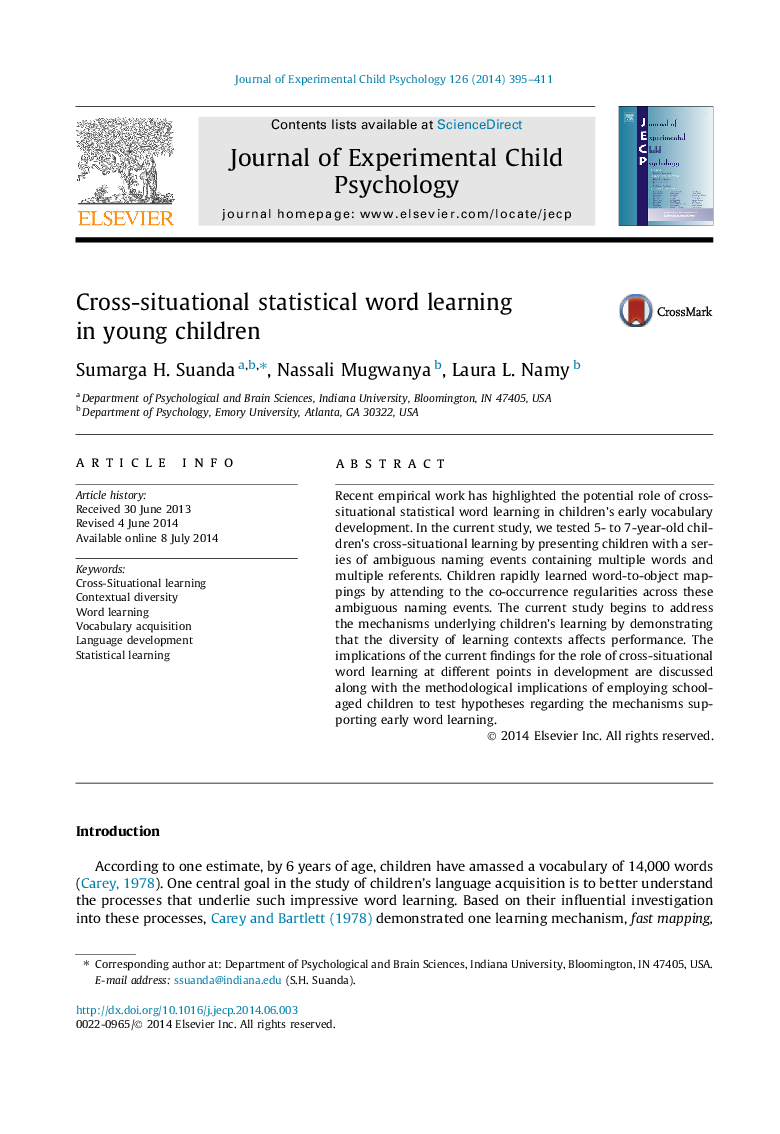| کد مقاله | کد نشریه | سال انتشار | مقاله انگلیسی | نسخه تمام متن |
|---|---|---|---|---|
| 7275424 | 1473486 | 2014 | 17 صفحه PDF | دانلود رایگان |
عنوان انگلیسی مقاله ISI
Cross-situational statistical word learning in young children
ترجمه فارسی عنوان
یادگیری آماری کلمه عبور متقابل در کودکان جوان
دانلود مقاله + سفارش ترجمه
دانلود مقاله ISI انگلیسی
رایگان برای ایرانیان
کلمات کلیدی
یادگیری متقابل، تنوع متنی، یادگیری کلمه، کسب واژگان، توسعه زبان، یادگیری آماری،
ترجمه چکیده
کار تجربی اخیر، نقش بالقوه یادگیری لغات آماری متقابل موقعیت را در توسعه واژگان اولیه کودکان برجسته کرده است. در مطالعه حاضر، ما کودکان و نوجوانان 5 تا 7 ساله را در زمینه یادگیری متقابل وضعیت مورد آزمایش قرار دادیم و کودکان را با مجموعه ای از حوادث نامگذاری مبهم حاوی کلمات متعدد و مرجع چندگانه مورد آزمایش قرار دادیم. کودکان با در نظر گرفتن نظمهای مشترک در این حوادث نامگذاری مبهم، به سرعت در حال یادگیری مقادیر واژگان کلامی هستند. این مطالعه در حال حاضر به مکانیسم های یادگیری کودکان می پردازد و نشان می دهد که تنوع زمینه های یادگیری بر عملکرد تاثیر می گذارد. مفاهیم یافته های فعلی برای نقش یادگیری کلمه متقابل در نقاط مختلف توسعه همراه با مفاهیم روش شناختی از استخدام کودکان مدرسه برای تست فرضیه ها در مورد مکانیسم حمایت از یادگیری زود هنگام بحث می شود.
موضوعات مرتبط
علوم انسانی و اجتماعی
روانشناسی
روانشناسی رشد و آموزشی
چکیده انگلیسی
Recent empirical work has highlighted the potential role of cross-situational statistical word learning in children's early vocabulary development. In the current study, we tested 5- to 7-year-old children's cross-situational learning by presenting children with a series of ambiguous naming events containing multiple words and multiple referents. Children rapidly learned word-to-object mappings by attending to the co-occurrence regularities across these ambiguous naming events. The current study begins to address the mechanisms underlying children's learning by demonstrating that the diversity of learning contexts affects performance. The implications of the current findings for the role of cross-situational word learning at different points in development are discussed along with the methodological implications of employing school-aged children to test hypotheses regarding the mechanisms supporting early word learning.
ناشر
Database: Elsevier - ScienceDirect (ساینس دایرکت)
Journal: Journal of Experimental Child Psychology - Volume 126, October 2014, Pages 395-411
Journal: Journal of Experimental Child Psychology - Volume 126, October 2014, Pages 395-411
نویسندگان
Sumarga H. Suanda, Nassali Mugwanya, Laura L. Namy,
